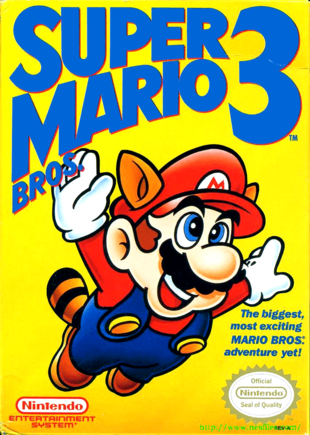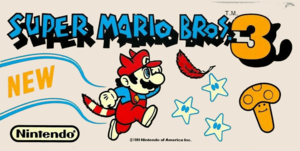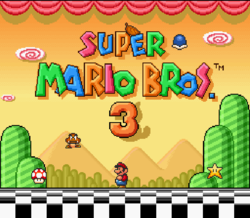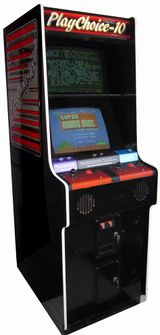Super Mario Bros. 3

| |
| Super Mario Bros. 3 | |
| Developer | Nintendo R&D4 |
|---|---|
| Publisher | Nintendo |
| Platforms | NES, Arcade, SNES, Super Famicom Box, GBA, Wii, 3DS, Wii U, NES Classic Edition, Nintendo Entertainment System – Nintendo Switch Online |
| Released | Nintendo Entertainment System, Famicom Japan: October 23, 1988 North America: February 12, 1990 Europe, Oceania: August 29, 1991 Arcade (PlayChoice-10) United States: July 15, 1989 Super Nintendo Entertainment System Japan (Collection): July 14, 1993 North America (All-Stars): August 1, 1993 Europe, Oceania (All-Stars): August 1, 1993 Canada, US (Stars + World): December 1994 Europe (Stars + World): 1995 Super Famicom Box Japan (PSS-61, Super Mario Collection): 1994 Game Boy Advance (Mario Advance 4) Japan: July 11, 2003 Europe, Oceania: October 17, 2003 North America: October 21, 2003 Wii NA (Virtual Console): November 5, 2007 EU, Oceania (Virtual Console): November 9, 2007 Japan (Virtual Console): December 11, 2007 Japan (All-Stars): October 21, 2010 Oceania (All-Stars): December 2, 2010 Europe (All-Stars): December 3, 2010 North America (All-Stars): December 12, 2010 Nintendo 3DS (Virtual Console) Japan: January 1, 2013 Wii U (Virtual Console) Japan (Famicom): December 25, 2013 North America (NES): April 17, 2014 Japan (GBA): January 21, 2016 NES Classic Edition, Famicom Mini Worldwide: November 10, 2016 Nintendo Switch (Nintendo Switch Online) Worldwide (NES): September 18, 2018 Worldwide (SNES): September 3, 2020 Worldwide (GBA): May 25, 2023 |
| Added to Museum |
Wii All-Stars: January 20, 2012 NES CE: June 22, 2017 Famicom Mini: August 10, 2017 SNES All-Stars+World: December 19, 2018 |

|
Super Mario Bros. 3 was first released for the Famicom by Nintendo in 1988, and then on the international version of the Famicom, the Nintendo Entertainment System, in 1990. It was part of Nintendo's flagship series, the Super Mario series. As such, it was brought to most of Nintendo's subsequent systems, either as ports or through emulation.
Story
An Italian plumber named Mario and his brother Luigi once again find themselves in the Mushroom Kingdom. There, they traveled across eight different kingdoms and collected power-ups to defeat enemies standing in their way, on their quest to rescue Princess Toadstool from Bowser.
The first seven kingdoms had a castle that was taken over by one of Bowser's Koopalings. The Koopalings retreated to their fortified airship and awaited the arrival of one of the Mario Bros. Beating these foes caused them to drop wands. The wands were then taken back to the castle, and each of the seven kings, who had all been transformed by magic, returned to normal. The princess sent notes containing power-ups after each king was restored.
Finally, upon defeating Bowser at the castle in the eighth world, Mario finally rescued Princess Toadstool. All of the Kings were restored to their true form, Bowser and his Koopalings were forced out of all of the kingdoms, and peace was restored to the Mushroom World.
Versions of the game
As Nintendo's part of Nintendo's flagship series, Super Mario Bros. 3 has been released on many different systems, both through traditional game ports and through emulation.
It was released for the Family Computer in Japan in 1988 and for its international variant, the Nintendo Entertainment System in North America in 1990 in North America, then in Europe and Oceania in 1991. Published by Mattel in Canada, It was one of the sixty games that had a separate release in the country. It also was published by Nintendo in North America, with a cartridge labeled for sale in Canada, Mexico, and the United States.
For coin-operated use, it was released to arcades on the PlayChoice-10 system in 1989. This system allowed playing of up to ten NES-based games before the system's timer ran out.
It received an enhanced port for the Super Nintendo Entertainment System as part of Super Mario All-Stars in 1993. In 1998, six worlds from the Super Mario All-Stars version were included in BS Super Mario Collection for the Satellaview broadcast satellite add-on for the Super Famicom.
The game, based on the Super Mario All-Stars version, was then ported to the Game Boy Advance, and released as Super Mario Advance 4: Super Mario Bros. 3 in 2003.
An emulated version of the NES version was released for the Virtual Console on Wii in 2006. An emulated version of the SNES version of Super Mario All-Stars was released as Super Mario All-Stars Limited Edition on Wii for the 25th anniversary of Super Mario Bros. in 2010.
An emulated version of the NES version was released on the Nintendo 3DS and Wii U Virtual Consoles in 2013. Then, an emulated version of the GBA version was released for the Wii U Virtual Console on January 21, 2016.
Super Mario Bros. 3 was also included as one of the 30 games in the NES Classic Edition and Family Computer Mini miniature video game consoles, which were both released in 2016. It was then released as one of the launch titles of the Nintendo Entertainment System - Nintendo Switch Online service for Nintendo Switch in 2018.

